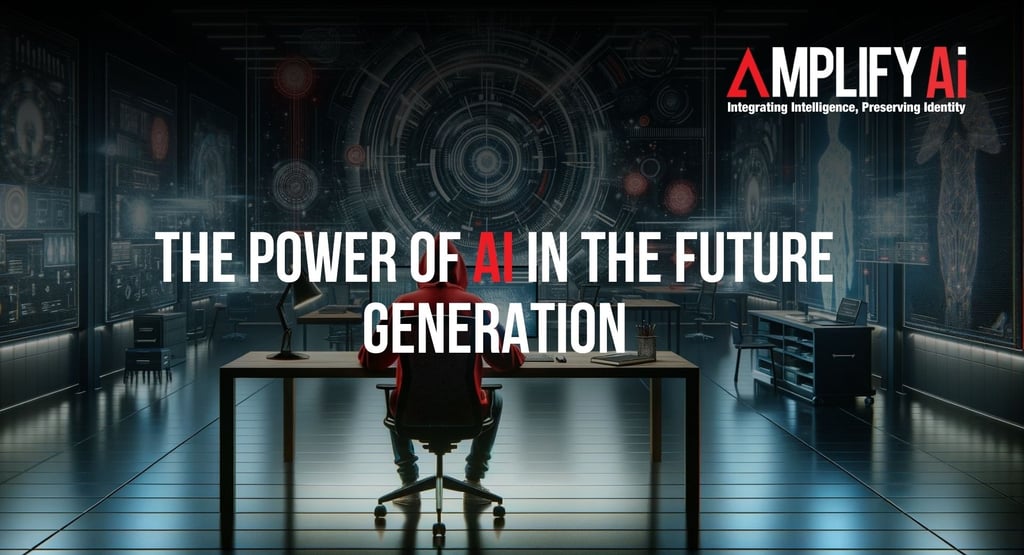The Power of AI in the Future Generation
Ronsley Vaz
4 min read


Artificial intelligence (AI) has emerged as a powerful tool with immense potential for transforming businesses. However, harnessing the power of AI requires a deep understanding of its implications and challenges. The historical reliance on soil for automation parallels the emerging era of digital soil powered by AI. There is a profound reflection on the shifting dynamics of education, urging a focus on vitality over functionality to navigate a future where AI handles much of the functional aspects of society.
The Evolution of Digital Soil
There has been a significant shift from relying on natural intelligence to the emergence of artificial intelligence (AI). This transition can be likened to the historical reliance on soil, which has played a crucial role in the creation of value over thousands of years. With the power of AI, small inputs can yield substantial outputs, leading to profound implications for society as it navigates this new era of digital soil.
The evolution of digital soil signifies a fundamental change in how value is created in society. As AI continues to reshape industries, it becomes crucial to address the potential risks of a concentrated power structure in the digital landscape. By exploring the challenges and opportunities of AI integration, as well as the ethical considerations surrounding data ownership and transparency, we can strive for a balanced society that harnesses the potential of AI while ensuring equal opportunities for all.
Societal Inequality in the AI Age
Artificial intelligence (AI) has brought about significant transformations in various industries, but with these advancements comes a growing concern about the potential risks of a concentrated power structure in the digital landscape. The rise of AI has the potential to exacerbate societal inequality, creating a divide between those who have access to and control over AI technologies and those who do not. It is crucial to establish ethical frameworks that promote transparency, accountability, and data ownership to mitigate these concerns and ensure that the benefits of AI are distributed equitably.
The concentration of power in the hands of a few individuals or organisations can lead to a digital divide, where certain groups or communities are left behind. It is essential to foster a society that embraces inclusivity and actively works towards bridging the gap. This involves not only addressing the potential biases and discriminatory algorithms that can arise in AI systems but also promoting accessibility and equal opportunities for all individuals to engage with and benefit from AI technologies.
Deliberate Creation of Middle-Class
The intentional construction of a middle class wasn't a mere coincidence; rather, it was a strategic response to the evolving conditions of the time. This deliberate creation of a middle class became a stabilising force, averting the extremes of highly automated societies that tend to default towards a feudal structure with stark disparities between rulers and the ruled.
As we stand on the cusp of another profound societal transformation ushered in by automation and artificial intelligence, the importance of intentional societal structures becomes glaringly apparent. Crafting a blueprint that ensures equitable distribution of opportunities, resources, and benefits in the face of evolving technology becomes a paramount task. The intentional creation of a middle class, as witnessed in history, offers a valuable lesson - a strategic, well-thought-out approach is key to steering society towards balance and preventing the emergence of extreme imbalances fueled by automation.
Ethical Framework for AI
With the advancements of AI come important ethical considerations regarding AI implementation and data ownership. One crucial aspect is the concept of treating data as a common resource and advocating for collective ownership. By recognising data as a shared asset; businesses can foster a more inclusive and equitable AI landscape. Furthermore, transparency and accountability play a vital role in AI implementation. It is essential for organisations to communicate the underlying algorithms and decision-making processes to stakeholders, promoting trust and understanding.
The ethical framework surrounding data ownership and accountability holds immense significance. Treating data as a common resource ensures that its benefits are distributed equitably and not concentrated in the hands of a few. This approach fosters a more inclusive society and mitigates the risks of a digital divide. Additionally, transparency and accountability are key pillars of ethical AI implementation. By upholding these ethical principles, organisations can harness the full potential of AI while ensuring that it is used responsibly for the benefit of all.
Distinction Between Vitality and Functionality
Vitality, defined as the irreplaceable life force inherent in humans, and functionality, the transformation of individuals into component labour, are particularly relevant in the contemporary era, marked by the pervasive influence of artificial intelligence (AI) and automation. The traditional approach involved a systematic transition from a state of abundant vitality in childhood to a more functional existence as individuals gained skills and became component parts of industrial machinery.
In the face of an impending AI-dominated world, the paradigm must shift once again. As automation increasingly handles functional aspects of work, the emphasis must return to preserving and maximising vitality. The evolving societal dynamics necessitate a departure from the previous focus on creating functional, skilled individuals towards fostering a society that places a premium on the irreplaceable life force within each person.
Preparing Future Generations for the AI Era
It is vital to equip future generations with the necessary skills and knowledge to thrive in this technologically advanced digital landscape. A key emphasis should be placed on striking a balance between functionality and vitality in education, fostering the development of well-rounded individuals who can effectively adapt to the ever-evolving demands of an AI-powered future. By nurturing a curriculum that encompasses not only technical expertise but also critical thinking, creativity, and emotional intelligence, we can empower the next generation to navigate the complexities of AI with confidence and resilience.
Preparing for the AI era goes beyond technical proficiency; it requires instilling an understanding of the ethical implications and societal impact of AI. Education should include discussions around the challenges and opportunities presented by AI integration. By providing a comprehensive education that addresses both the practical and ethical dimensions of AI, we can ensure that future generations are well-prepared to harness the potential of AI while also ensuring its responsible and ethical use for the benefit of all.
The world of AI in business continues to evolve, offering unprecedented opportunities and challenges. The digital soil is evolving, as are the profound implications of transitioning from natural intelligence to artificial intelligence. The importance of preparing future generations for the AI era has been emphasised, along with the challenges and opportunities of AI integration. By embracing AI with caution and considering its ethical implications, business owners can unleash its power and navigate its implementation successfully.
Subscribe to the podcast
Subscribe now to "Amplify Ai" and let's set sail together on this exciting voyage towards business growth and success.



